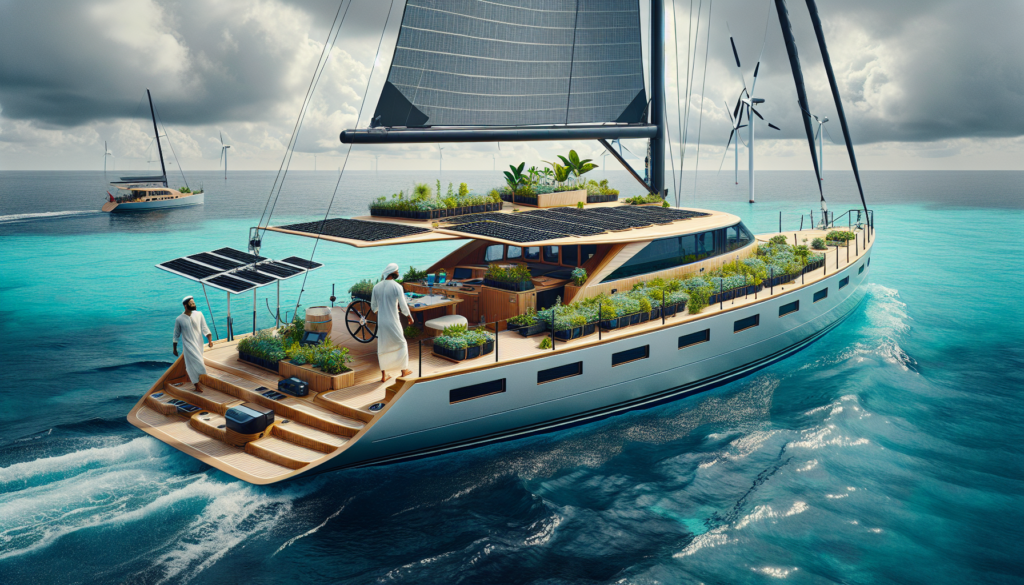You’re a lover of the open water, your heart is drawn to the rhythmic lapping of waves against the hull of a boat. But amidst your maritime pursuits, there’s a niggling worry. You wonder about your impact on the environment, specifically, your carbon footprint as a boater. Rest easy, because you’re about to get a roadmap on how to reduce your carbon footprint in ten manageable steps, while still enjoying your time on the water. This is about uniting your love for boating with your commitment to the environment. So, get ready to cast off into a more sustainable future with “10 Ways To Minimize Your Carbon Footprint While Boating”.

Choose Environmentally Friendly Hull Materials
Choosing an environmentally friendly hull material for your boat is one of the most significant ways you can reduce your environmental impact. Your boat’s hull is the largest part that comes into contact with water, so the material it’s made from significantly affects the environment around it.
Understanding different hull materials
Boats can be made from many different materials including wood, aluminum, steel, and composite materials like fiberglass. Wood is the most traditional hull material and is both renewable and biodegradable, although it requires regular maintenance to prevent rot and other damage. Metal hulls like aluminum and steel are durable and recyclable, but their production process can be harmful to the environment. Composite boats are lightweight and maintenance-free, but can be challenging to recycle at the end of their life.
Choosing recyclable materials for your hull
When choosing the hull material for your boat, consider how it will be disposed of at the end of its life. Steel and aluminum hulls are both 100% recyclable, and with today’s technology, they can be recycled without losing any quality. Composite materials, on the other hand, are more difficult to recycle, but research is ongoing to improve this process.
Benefits of eco-friendly hull materials
Aside from reducing waste, eco-friendly hull materials have many other benefits. They can often be lighter than conventional materials, reducing the fuel needed to power your boat. They can also be more durable, requiring less maintenance and reducing the need for harmful cleaning and maintenance products.
Opt for Solar Powered Boats
Solar power is an increasingly popular choice for boaters. By harnessing the sun’s energy, you can reduce your dependence on fossil fuels and contribute to a cleaner, greener environment.
Benefits of solar power in boating
Solar power offers many benefits for boaters. It’s a renewable source of energy that can reduce your carbon footprint and save you money in the long run. With solar panels installed on your boat, you can power your electrical systems without relying on a traditional generator, reducing noise, pollution and fuel expenses.
How solar panels work on boats
Solar panels on boats work the same way they do on land. They capture sunlight and convert it into electricity, which is then stored in a battery for later use. This energy can be used to power lights, pumps, refrigeration, and other electrical systems on your boat.
Comparing solar power vs. traditional fuel sources
When compared to traditional fuel sources, solar power comes out on top in terms of environmental impact. Fossil fuels emit harmful greenhouse gases when burned, but solar power is completely clean and renewable. Solar can also be more cost-effective in the long run.

Responsibly Dispose of Waste
Waste disposal is a significant part of boating responsibly and reducing your impact on the environment.
Means to dispose waste while boating
Most waste can be stored on board your boat until you are able to properly dispose of it on land. You can also use holding tanks for sewage and graywater, which can be emptied at pump-out stations.
Dangers of improper waste disposal at sea
Improper waste disposal at sea can have devastating effects. It can harm marine life, pollute water, and even pose a risk to human health.
Practising waste management on your boat
You can practice waste management on your boat by reducing, reusing, and recycling as much as possible. Avoid products with excessive packaging, and bring along reusable items like water bottles and grocery bags. Always dispose of waste properly.
Use Eco-Friendly Cleaning Products
Traditional cleaning products often contain harsh chemicals that can harm the environment. By choosing eco-friendly alternatives, you can keep your boat clean without hurting the planet.
Harmful effects of standard cleaning products
Standard cleaning products often contain phosphates, bleaches, and other chemicals that can damage aquatic life. When washed into the water, they can cause algal blooms, deplete oxygen levels, and harm marine ecosystems.
Choosing biodegradable cleaning products
biodegradable cleaning products break down naturally in the environment, minimizing harm to marine life. Look for products made from plant-based ingredients and avoid those with phosphates, bleach, or other harsh chemicals.
Cleaning your boat without harming the environment
In addition to using eco-friendly cleaning products, you can reduce your environmental impact by limiting water use and avoiding cleaning near waterways. Wash your boat on land whenever possible, and use a bucket and sponge rather than a hose to save water.
Maintain Your Boat Regularly
regular boat maintenance is key to keeping your boat operating efficiently and reducing its environmental impact.
How regular maintenance reduces carbon footprint
A well-maintained boat operates more efficiently and uses less fuel, reducing your carbon footprint. Regular maintenance also allows you to catch problems early, often mean fewer repairs down the line.

